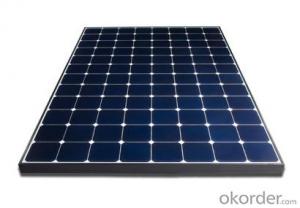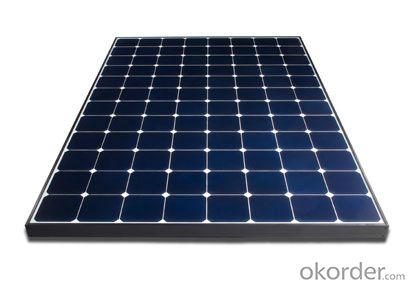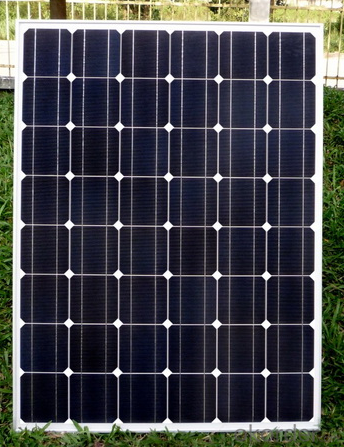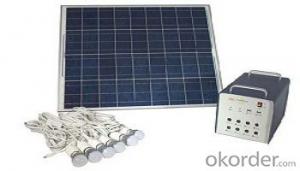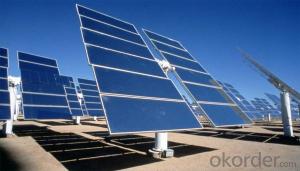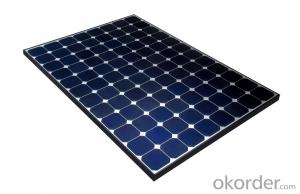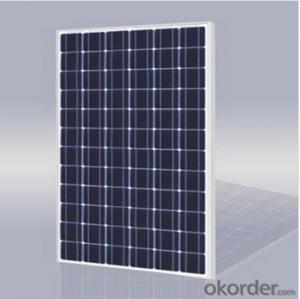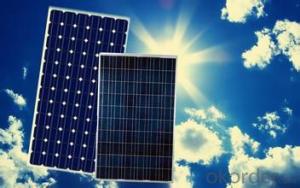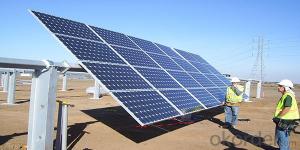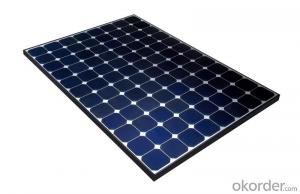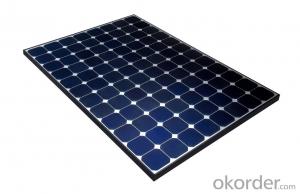120kw CNBM Monocrystalline Silicon Solar Energy Systems Alston Panel for Home Use
- Loading Port:
- Tianjin
- Payment Terms:
- TT OR LC
- Min Order Qty:
- 50 watt
- Supply Capability:
- 1000 watt/month
OKorder Service Pledge
OKorder Financial Service
You Might Also Like
Specification
120KW CNBM Monocrystalline Silicon Panel for Home Using
Production description
Off-the-grid homes are autonomous; they do not rely on municipal water supply, sewer, natural gas, electrical power grid, or similar utility services. A true off-grid house is able to operate completely independently of all traditional public utility services. The idea has been recently popularized by certain celebrities including Ed Begley, Jr.[1] who stars in Living with Ed[2] television show on the Home & The United Nations Development Programme in its 2000 World Energy Assessment found that the annual potential of solar energy was 1,575–49,387 exajoules (EJ). This is several times larger than the total world energy consumption, which was 559.8 EJ in 2012.
Electrical power can be generated on-site with renewable energy sources such as solar (particularly with photovoltaics), wind, micro hydro, geothermal; with agenerator or Micro combined heat and power with adequate fuel reserves. Such a system is called a stand-alone power system. In addition, it is possible to simply eliminate electric power such as in Old Order Amish and Old Order Mennonite communities.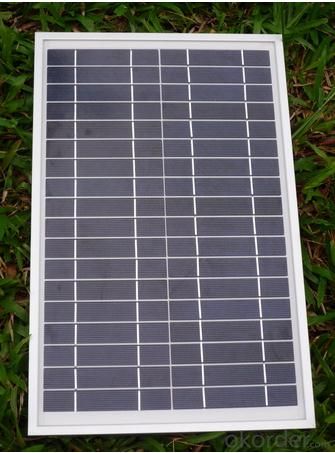
Feature
1.High conversion efficiencies resulting in superior power output performance.
2.Outstanding power output even in low light or high temperature conditions
3.Optimized design for ease of soldering and lamination
Physical characteristic
1. Rigorous quality control meets the highest international standards.
2. High-transmissivity low-iron tempered glass, strong aluminium frame.
3. Using UV-resistant silicon.
4. IS09001/14001/CE/TUV/UL
Packaging
26pcs in one carton 6pallets in 20foot container 14pallets in 40 foot container.
- Q: Are there any noise concerns with solar energy systems?
- Yes, there are generally no noise concerns with solar energy systems as they do not have any moving parts and operate silently.
- Q: Do solar energy systems require specialized insurance?
- Yes, solar energy systems typically require specialized insurance due to the unique risks associated with their installation and operation.
- Q: Can a solar energy system be used for heating and cooling?
- Yes, a solar energy system can be used for heating and cooling through the use of solar thermal technology or heat pumps. Solar thermal systems can capture and convert sunlight into heat, which can be used for space heating and water heating. Heat pumps can also utilize solar energy to extract heat from the air or ground and transfer it indoors for heating or release it outdoors for cooling.
- Q: Can solar energy systems be used for desalination of water?
- Yes, solar energy systems can be used for desalination of water. Solar-powered desalination systems use solar energy to power the desalination process, typically through the use of photovoltaic (PV) panels or solar thermal collectors. These systems can convert seawater or brackish water into fresh water by harnessing the sun's energy to heat, evaporate, and condense the water, leaving behind the salt and other impurities. Solar desalination offers a sustainable and environmentally friendly solution to address water scarcity in areas with abundant sunlight.
- Q: Can a solar energy system be installed on a historic building?
- Installing a solar energy system on a historic building is indeed possible, but it necessitates careful consideration and planning to avoid compromising the building's integrity or aesthetic appeal. Preservation laws and regulations often safeguard historic buildings, which can impose limitations on visible modifications. In such instances, solar panels can be strategically placed on the less conspicuous sides or at the rear of the building, or even incorporated into existing structures like roofs or awnings to minimize their visual impact. Collaboration with preservation experts and architects is essential in designing the solar system to ensure it harmonizes with the building's historic character. By undertaking proper planning and execution, a solar energy system can successfully blend into a historic building, simultaneously reducing its carbon footprint and preserving its architectural charm.
- Q: How does solar energy affect property value?
- There are various ways in which solar energy can positively impact property value. To begin with, homes that are equipped with solar panels are generally viewed as being more eco-friendly and energy-efficient, which appeals to an increasing number of homebuyers who prioritize sustainability. This rise in demand can result in an increase in property values. Moreover, solar panels can considerably reduce or even eliminate electricity bills, making a home more affordable to live in over time. This financial advantage can make a property more appealing to potential buyers and enhance its desirability. Additionally, certain studies have indicated that homes with solar panels sell at a faster rate when compared to those without, implying that solar energy can enhance a property's marketability. All in all, solar energy has the potential to raise property value by decreasing energy costs, attracting environmentally-conscious buyers, and boosting marketability.
- Q: Can a solar energy system be installed on a sports field or stadium?
- Yes, a solar energy system can be installed on a sports field or stadium. In fact, many sports fields and stadiums around the world have already adopted solar energy systems to meet their energy needs. These systems typically consist of solar panels that are installed on the roofs or surrounding areas of the facility. The large surface area of sports fields and stadiums often makes them ideal locations for solar panel installations. The benefits of installing a solar energy system on a sports field or stadium are numerous. Firstly, it allows the facility to generate clean and renewable energy, reducing its reliance on traditional fossil fuels and lowering its carbon footprint. This aligns with the growing global concern for environmental sustainability. Additionally, solar energy systems can significantly reduce energy costs for sports facilities in the long run. The electricity generated from solar panels can be used to power the stadium lights, scoreboards, sound systems, and other equipment. Any excess energy can be fed back into the grid, potentially earning the facility revenue through net metering or feed-in tariffs. Furthermore, installing a solar energy system on a sports field or stadium can serve as a powerful symbol of environmental consciousness and sustainability. It can inspire and educate fans, athletes, and the larger community about the importance of renewable energy and the potential for solar power in meeting our energy needs. In summary, a solar energy system can indeed be installed on a sports field or stadium, providing numerous benefits such as clean and renewable energy generation, reduced energy costs, and promoting environmental sustainability.
- Q: Can solar energy systems be used in areas with high levels of bird activity?
- Solar energy systems can indeed be used in areas where there are many birds. However, it is crucial to take precautions in order to ensure the safety of the birds and the optimal performance of the solar panels. A common concern is the possibility of birds colliding with the panels. To address this, manufacturers often include bird deterrents such as mesh screens or reflective coatings on the panels, which make them more visible to birds and decrease the risk of collisions. Additionally, proper installation and maintenance of the solar energy systems can minimize potential nesting or roosting sites for birds, thus reducing the likelihood of damage to the panels. By addressing these considerations, it is possible to effectively utilize solar energy systems in areas with high bird activity while still protecting the local bird population.
- Q: How do solar energy systems impact energy consumption patterns?
- Solar energy systems have a significant impact on energy consumption patterns by reducing the reliance on traditional energy sources. They provide a clean and renewable source of electricity, allowing individuals and businesses to generate their own power. This helps to decrease the overall demand for fossil fuels, leading to a more sustainable and environmentally friendly energy consumption pattern. Additionally, solar energy systems often incentivize energy conservation practices, as users become more aware of their electricity usage and strive to maximize the benefits of their solar panels.
- Q: Can solar energy systems be used in powering retirement homes or assisted living facilities?
- Yes, solar energy systems can certainly be used to power retirement homes or assisted living facilities. In fact, solar energy can be a highly beneficial and cost-effective solution for these types of facilities. Retirement homes and assisted living facilities have a high energy demand due to the need for heating, cooling, lighting, and various electrical appliances. By installing solar panels on the rooftops or in suitable areas, these facilities can generate their own electricity and reduce their reliance on the grid. Solar energy systems can help these facilities reduce their operating costs significantly, as they can offset a considerable portion of their electricity bills. This is especially important for retirement homes and assisted living facilities, as they often operate on tight budgets and need to allocate resources efficiently. By harnessing solar power, these facilities can redirect the saved funds towards providing better care and services for their residents. Furthermore, solar energy systems contribute to a cleaner and greener environment. Retirement homes and assisted living facilities have a responsibility towards their residents' well-being, and by using solar power, they can reduce their carbon footprint and promote sustainability. This can have a positive impact on the health and overall quality of life for the residents. Additionally, solar energy systems can provide a reliable source of power during emergencies or power outages. Particularly in areas prone to extreme weather events, where power disruptions are more common, having a solar energy system with battery storage can ensure continuous and uninterrupted power supply to critical areas such as medical equipment, lighting, and HVAC systems. In conclusion, solar energy systems are a viable and beneficial option for powering retirement homes or assisted living facilities. They can significantly reduce operating costs, promote sustainability, and provide a reliable source of power, ultimately improving the quality of care and services provided to residents.
Send your message to us
120kw CNBM Monocrystalline Silicon Solar Energy Systems Alston Panel for Home Use
- Loading Port:
- Tianjin
- Payment Terms:
- TT OR LC
- Min Order Qty:
- 50 watt
- Supply Capability:
- 1000 watt/month
OKorder Service Pledge
OKorder Financial Service
Similar products
Hot products
Hot Searches
Related keywords
